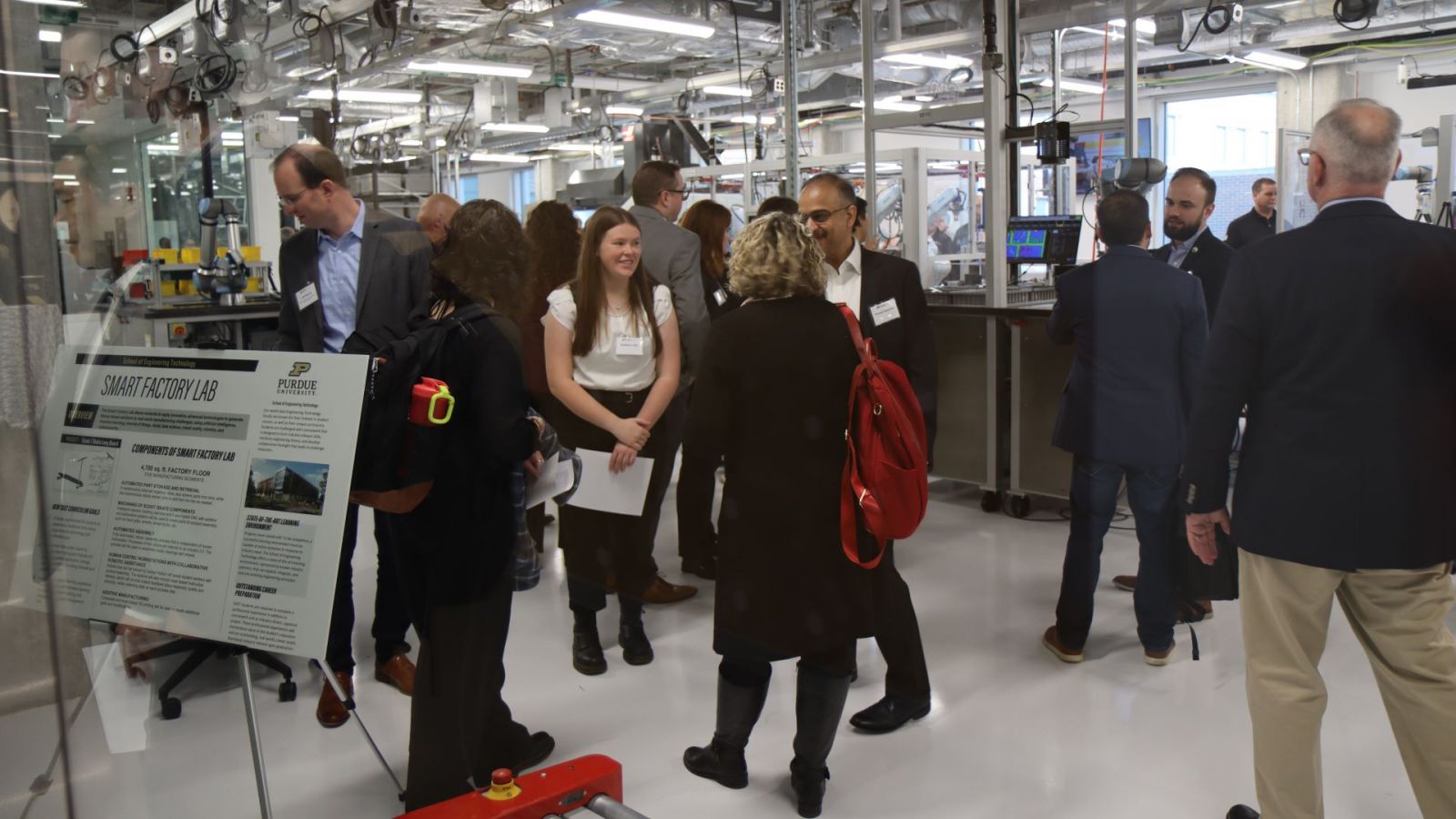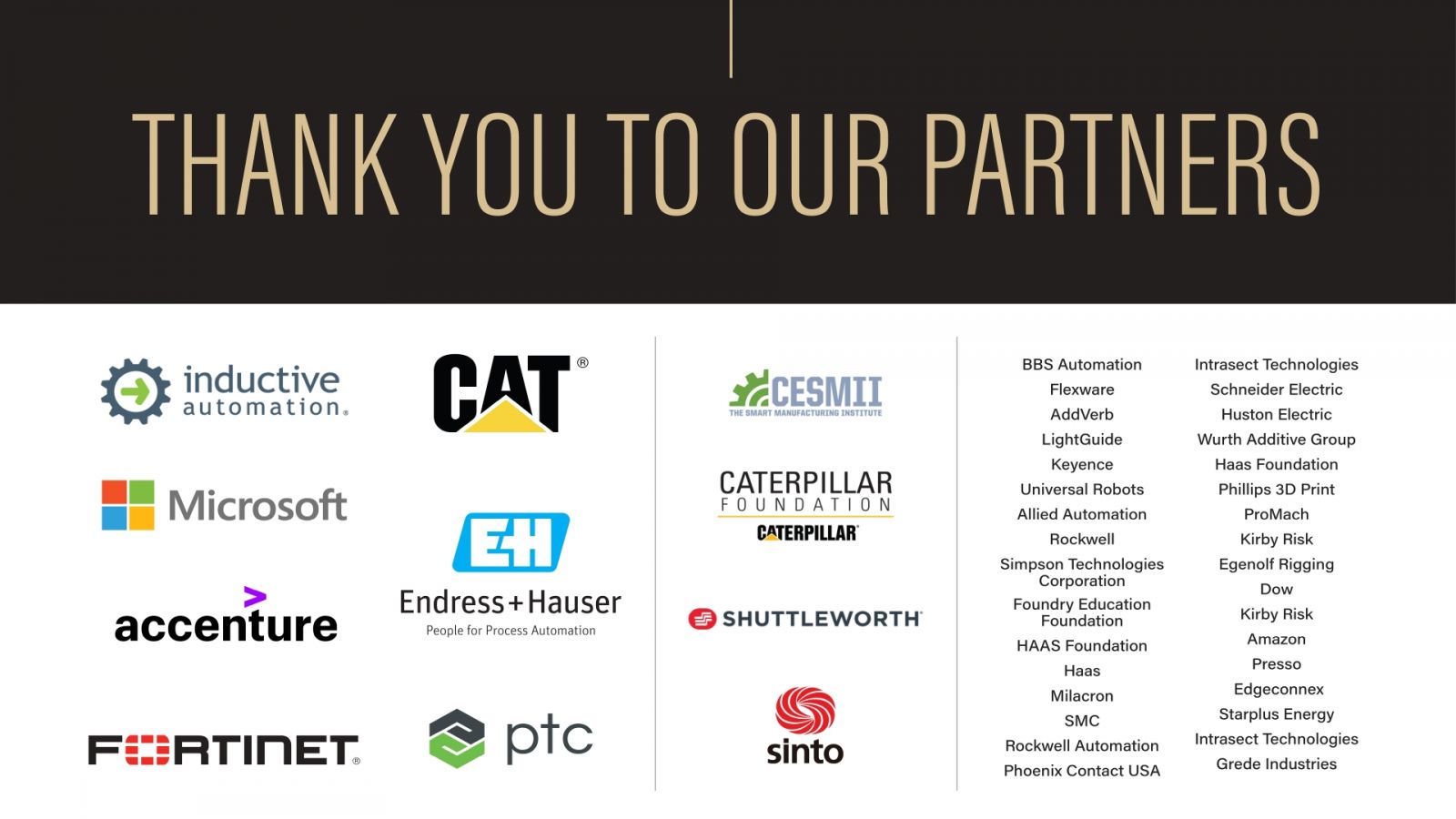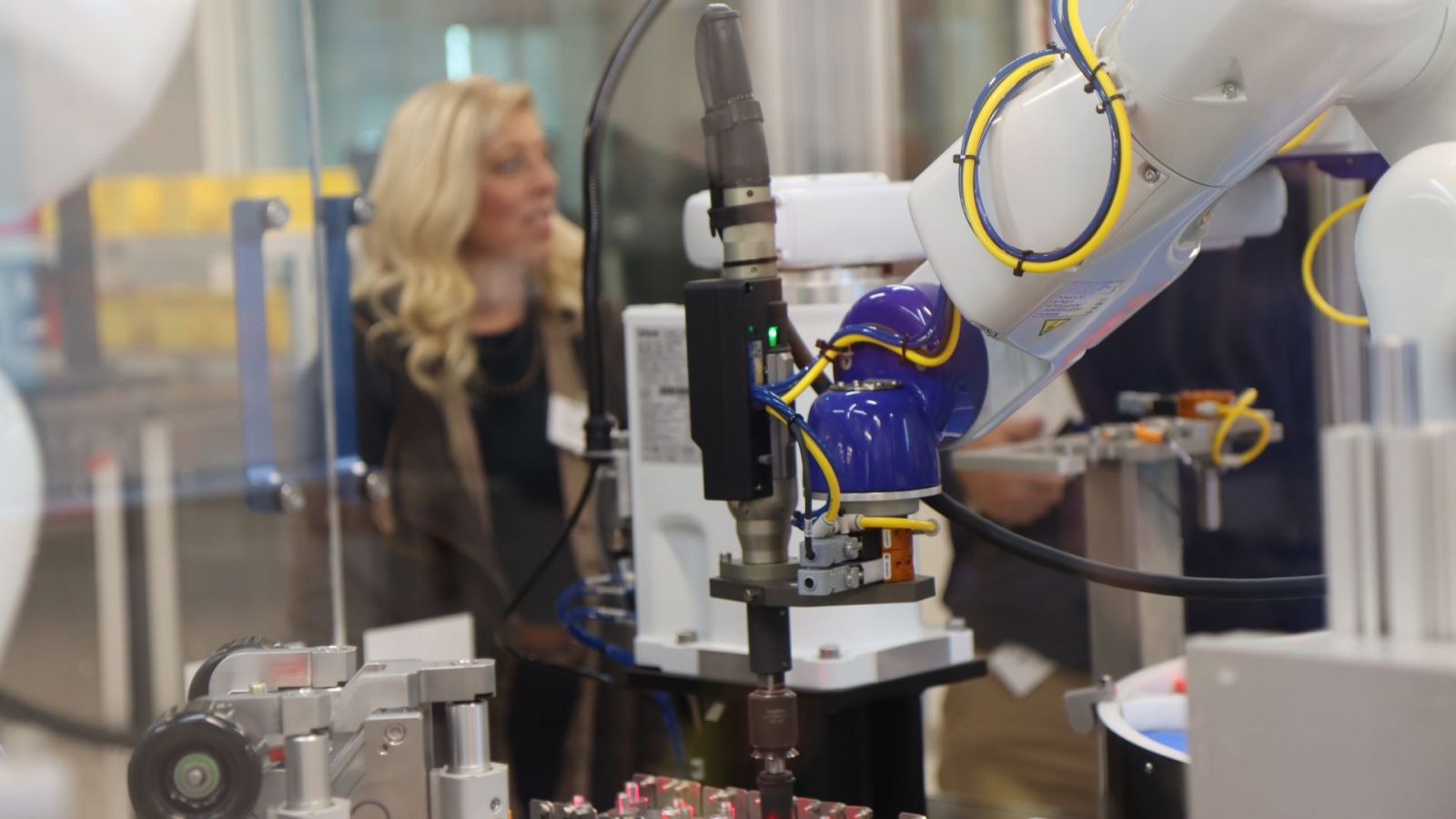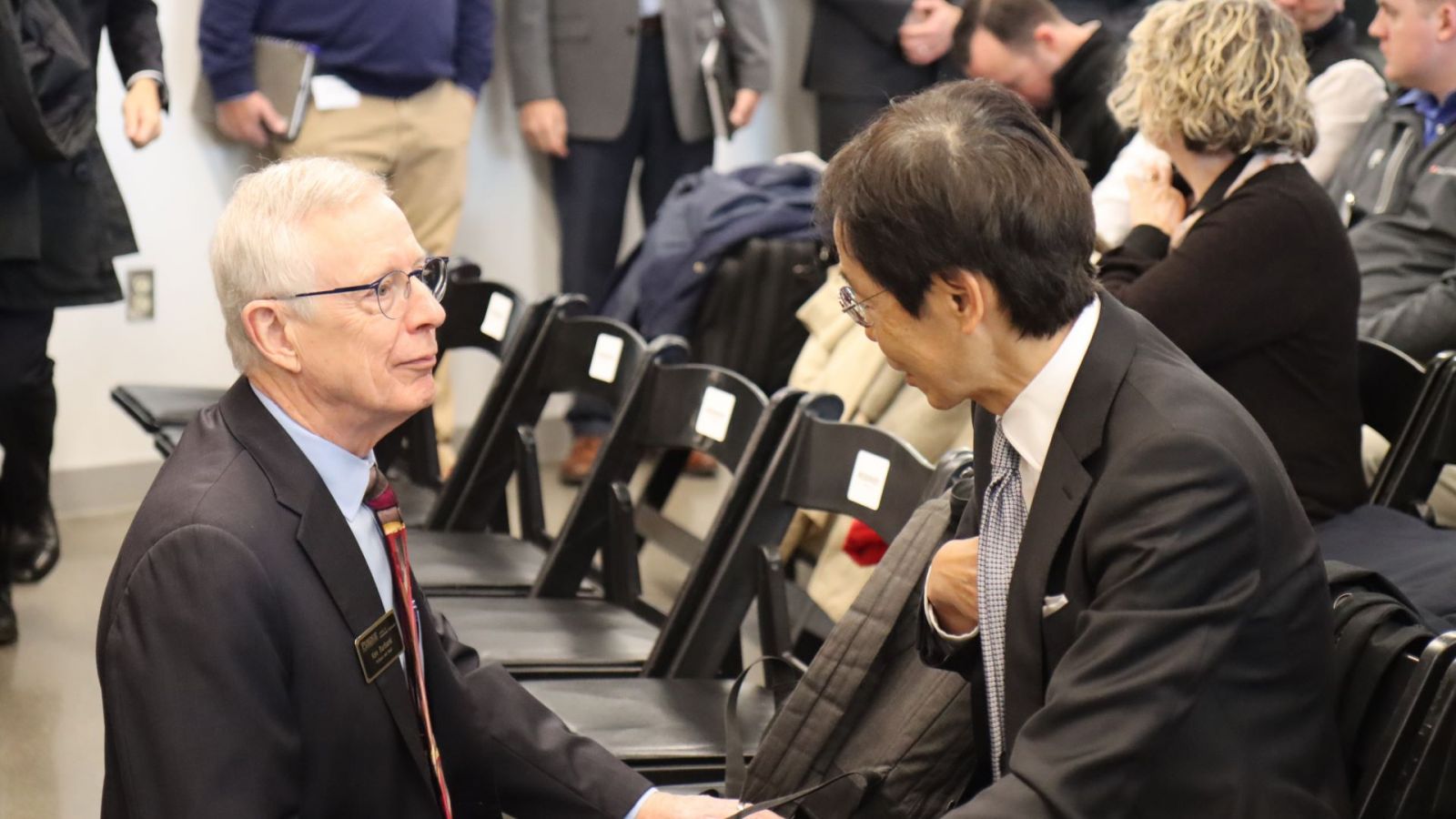
On Thursday, November 30, Purdue Polytechnic’s School of Engineering Technology hosted a broad collection of stakeholders, industry partners and government organizations in order to dedicate the school’s new smart manufacturing labs.
Between the four facilities, engineering technology will have unprecedented capacity to support many majors with technologically advanced, experience-based curriculum. This is up to and including a new major called Smart Manufacturing Industrial Informatics (SMII).
The four facilities are:
- The Smart Learning Factory, primary sponsors Accenture and Microsoft (Dudley Hall, Room 4353)
- The Smart Process Lab, primary sponsor is Endress+Hauser (Dudley Hall, Room 4377)
- The Industrial Internet-of-Things Lab, primary sponsor is Fortinet (Dudley Hall, Room 4383)
- The Smart Foundry, primary sponsor is Caterpillar (Lambertus Hall, Room B239)
In the wake of these openings, SMII and other engineering technology students are adopting new curricula that make the most of the smart manufacturing ecosystem, which mirrors the skills needed in a real, high-tech manufacturing setting. These skills include AI and machine learning, cybersecurity, augmented reality, autonomous robotics, data collection and troubleshooting among many others.
Sponsors have supplied relevant technology in each of these areas. In 2021, Becky House, a senior vice president and chief administrative/legal officer with Rockwell Automation gave an explanation for sponsors' investment in future-focused manufacturing education. “Advanced manufacturing is driving demand for a new type of technology-intensive [skillset],” House stated. Academic collaboration will allow industry partners “to meet the needs of tomorrow’s workforce.”
Many collaborators from Purdue, the government and the private sector all concurred that “smart” (i.e. data and tech-powered) manufacturing education will only become more important in the future. “We live in a world where technology changes rapidly,” said Daniel Castro, dean of Purdue Polytechnic. “The manufacturing industry needs people who are skilled, and can adapt to those changes.”

Creating the adaptability afforded by engineering technology’s curriculum proved to be a complex process for subject matter experts at the Polytechnic. John Dyck, CEO of the Department of Energy’s Clean Energy Smart Manufacturing Innovation Institute (CESMII), stated that establishing the Smart Learning Factory required working with Purdue (especially with the college’s industry sponsors and faculty including Ragu Athinarayanan, Grant Richards and the collection of eight original curriculum designers) “in a very strategic way, for a number of years.”
Strategic thinking resulted in looking abroad to countries that have retained strong manufacturing ties, even in an era of offshoring. In Purdue Polytechnic’s case, faculty and administrators searched and eventually encountered the learning factory—a facility designed to present a teachable model of how a real assembly process works, often by simply providing them with real, functional equipment.
![[The Smart Process lab, sponsored by Endress+Hauser, on the day of the dedication. (Purdue University photo/Zach Rodimel)]](/sites/default/files/images/newsroom/2023-24/Smart%20Manufacturing_dedication_story2.JPG)
That original learning factory, located in Germany’s Reutlingen University (eventually running a graduate program with the Polytechnic), reviewed parts of the smart manufacturing ecosystem at Purdue, now run under the supervision of Grant Richards, a professor in engineering technology. The German partners in learning factory-based curriculum, Drs. Daniel Palm and Vera Hummel, were also in attendance on November 30.
“It’s really beautiful, and it’s also very different to ours [in Reutlingen],” Hummel said. “Ours is a bit smaller, and many of our systems aren’t fully automated. Several of the systems here are automated, well beyond the basics like intelligent conveyor belts and whatnot.”
One such automated system comes courtesy of BBS Automation, a system integrator brought into the Smart Learning Factory’s assembly template provided by partners PTC, which also “talks” with software components from sponsors like Accenture, Fortinet and Rockwell. It produces combination skateboard/scooters as sample products for students to manufacture. BBS has set up a series of robotic arms designed to showcase to students how a cooperative group of machines can combine with human expertise to create consistent assembly for the wheel and truck components of the board.

This is part of an ethos of creating “co-bots” in the smart manufacturing ecosystem—machines designed to teach and help students or workers, rather than replace them.
While the automated arms can perform the truck assembly near-perfectly, “the idea is that the students get a real, physical experience with an actual production machine,” said Jim Fikert, senior controls engineer for BBS. “For the students doing assembly, they can look at this automated process and say ‘Hey, how is it doing this task better?’ From there, they get software experience by performing optimization and debugging for the arms’ software.”
Automation has even worked its way into the Caterpillar-sponsored Smart Foundry, found on a separate floor from the other three facilities, also dedicated on November 30. As all four facilities replicate a real-world manufacturing environment, this foundry is meant to be the first stop for raw materials that will be fabricated and later used in the Smart Learning Factory.
Laura McKinnon, a senior and a research assistant in mechanical engineering technology, remembers the old foundry experience in the now-replaced Michael Golden Labs. “There’s lots more automation, in addition to plenty of other things … it’s much less old-school now,” McKinnon. “We have automated mold-makers, there’s now a robotic arm that can work with heated materials, which is a huge upgrade in terms of safety features.”
Dean Castro stated that Caterpillar’s foundry sponsorship meant a great deal to him personally. “Caterpillar has always represented the advance of technology to me,” Castro said. “At the beginning of my career, in a coal mine in Colombia, the company I worked for had six CAT 793 trucks. And, since there was no internet at the time, my job was to climb into each of these trucks at 5 a.m., download their payload data, and then analyze it for next week’s plan. Later, when I first arrived in West Lafayette, the only familiar sight in town was the Caterpillar building. So I recognize this dedication as much more than just the opening of a facility. To me, it signifies the culmination of a journey from a coal mine, all the way to Purdue Polytechnic.”
Ken Burbank, head of the School of Engineering Technology, similarly emphasized the role of Purdue’s partners in bringing the smart manufacturing ecosystem to life. “We are fortunate to have such great administrators that can see a project of this duration and size through. … And all these named laboratory spaces are only possible because of the generosity of many people and companies.”

Other partners critical to the both the present and future of smart manufacturing at Purdue include the Dauch family, as mentioned by Purdue President Mung Chiang’s Chief of Staff, Alyssa Wilcox. “Without their philanthropy, as well as the Lambertus and Dudley families for whom this whole building is named, none of this would be happening.”
Also present was the Consul-General to the Midwest from Japan, Jun Yanagi. Japanese industry cooperation with Purdue began in the 90s, with a memorandum of understanding signed by then-Purdue President Steven Beering. Yanagi stated that he hoped the facilities’ opening acted as a “catalyst” for Purdue to bring the gradually reshoring American manufacturing industry to new technological heights.
Accenture (a primary sponsor in the smart manufacturing ecosystem) has also provided a substantial scholarship to go to two students in one of five engineering technology majors: Smart Manufacturing Industrial Informatics, Digital Enterprise Systems, Automation and Systems Integration Technology, Mechatronics Engineering Technology or Robotics Engineering Technology.
Awardees only receive Accenture’s scholarship if they have merited it with academic performance. The current awardees are:
- Madeline Little (majoring in robotics engineering technology, and a members of bands and orchestras at Purdue)
- Matina Ypsilantis (also in robotics engineering technology, and a member in both the Robomasters Robotics Club and the Female Recruitment and Retention Initiative)
Additional information
- Smart Manufacturing Labs Dedication (Purdue Polytechnic YouTube)
- Hands-on learning in the Smart Foundry (Purdue Polytechnic YouTube)
- Purdue Polytechnic's Smart Learning Ecosystem
- Manufacturing in the Polytechnic
- Purdue Polytechnic's CESMII partnership, the Smart Manufacturing Innovation Center
- Smart Manufacturing Industrial Informatics (new major in the School of Engineering Technology)
- Purdue, Accenture sign five-year agreement in support of smart manufacturing (Purdue News)
- Flexware Innovation Collaborates with Purdue University to Enhance Smart Learning Factory (Hitachi U.S.A.)
